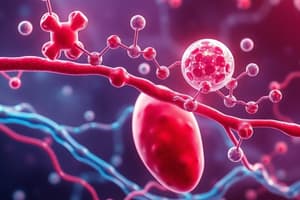Podcast
Questions and Answers
What is the process of vasodilation and how does it affect blood vessels?
What is the process of vasodilation and how does it affect blood vessels?
Vasodilation involves the relaxation of smooth muscle cells in arteries and veins, leading to an increase in vessel diameter. This allows for improved blood flow and oxygen delivery to tissues.
Explain the role of epinephrine in vascular regulation.
Explain the role of epinephrine in vascular regulation.
Epinephrine, also known as adrenaline, causes vasoconstriction in skeletal muscles, diverting more blood flow to vital organs like the heart and lungs.
How does nitric oxide contribute to vasodilation?
How does nitric oxide contribute to vasodilation?
Nitric oxide promotes the relaxation of vascular smooth muscle cells by increasing their permeability to calcium ions.
What is the function of calcitonin gene-related peptide (CGRP) in vascular physiology?
What is the function of calcitonin gene-related peptide (CGRP) in vascular physiology?
How do vasoactive polypeptides contribute to cardiovascular homeostasis?
How do vasoactive polypeptides contribute to cardiovascular homeostasis?
What are some common mechanisms of vasoconstriction and how do they work?
What are some common mechanisms of vasoconstriction and how do they work?
How do vasoactive polypeptides contribute to medical interventions?
How do vasoactive polypeptides contribute to medical interventions?
What physiological processes are influenced by vasoactive polypeptides related to blood vessel function?
What physiological processes are influenced by vasoactive polypeptides related to blood vessel function?
Explain the role of vasoactive polypeptides in modulating platelet aggregation.
Explain the role of vasoactive polypeptides in modulating platelet aggregation.
How do vasoactive polypeptides impact inflammation in the context of cardiovascular homeostasis?
How do vasoactive polypeptides impact inflammation in the context of cardiovascular homeostasis?
Flashcards are hidden until you start studying
Study Notes
Vasoactive Polypeptides: A Comprehensive Overview
Vasoactive polypeptides refer to molecules that can regulate the diameter of blood vessels by causing vasodilation or vasoconstriction. These peptides play a fundamental role in maintaining cardiovascular homeostasis and, consequently, overall health. In this article, we will explore the various aspects of vasoactive polypeptides, including their mechanisms, clinical applications, and physiological effects.
Mechanisms of Vasodilation and Vasoconstriction
Vasodilation
The process of vasodilation involves the relaxation of smooth muscle cells within the walls of arteries and veins, resulting in increased vessel diameter. This allows for improved blood flow and oxygen delivery to tissues. Several endogenous and exogenous factors contribute to vasodilation, such as:
-
Epinephrine: Also known as adrenaline, epinephrine is a hormone produced by the adrenal glands during times of stress. It causes vasoconstriction in skeletal muscles, allowing more blood flow to vital organs like the heart and lungs.
-
Nitric oxide: Nitric oxide is a small molecule that plays a crucial role in vasodilation. It promotes the relaxation of vascular smooth muscle cells by increasing their permeability to calcium ions.
-
Calcitonin gene-related peptide (CGRP): CGRP is a potent vasodilator released from sensory nerve fibers and certain immune cells called mastocytes. Its release can lead to localized vasodilation in response to inflammation and pain.
Vasoconstriction
In contrast, vasoconstriction refers to the constriction of smooth muscle cells within blood vessels, leading to decreased vessel diameter. This process is essential in maintaining blood pressure and regulating blood volume distribution. Some common mechanisms of vasoconstriction include:
-
Endothelin: Endothelin is a vasoconstrictor peptide secreted primarily by the endothelial cells lining the blood vessels. It acts through specific receptors located on the surface of smooth muscle cells, promoting their contraction and causing vasoconstriction.
-
Angiotensin II: Angiotensin II is a powerful vasoconstrictor hormone derived from angiotensin I. It acts on smooth muscle cells to promote vasoconstriction and increase blood pressure.
-
Thromboxane A2: Thromboxane A2 is generated in platelets and blood vessel walls when they are stimulated by thrombin or collagen. It promotes vasoconstriction and platelet aggregation, contributing to clot formation.
Clinical Applications and Regulation of Blood Pressure
Vasoactive polypeptides have significant implications in medical interventions. For example, drugs based on these compounds are used in the treatment of hypertension, shock, heart failure, and other cardiovascular diseases. Additionally, understanding the molecular mechanisms underlying the actions of vasoactive polypeptides provides valuable insights into potential therapeutic targets for managing cardiovascular disorders.
Physiological Effects of Vasoactive Polypeptides on Blood Vessels
Vasoactive polypeptides also influence various physiological processes related to blood vessel function. These effects include modulating:
-
Blood vessel growth: Vasoactive polypeptides can stimulate or inhibit the proliferation of endothelial and smooth muscle cell populations, thereby influencing new blood vessel formation.
-
Platelet aggregation: Vasoactive polypeptides can either enhance or suppress platelet activation, ultimately affecting blood coagulation and hemostasis.
-
Inflammation: Some vasoactive polypeptides, such as neuropeptide Y, contribute to inflammatory processes by modulating immune cell function and promoting the release of pro-inflammatory molecules.
In conclusion, vasoactive polypeptides play an essential role in maintaining cardiovascular homeostasis through their effects on blood vessel diameter and various physiological functions. Further research into these molecules may provide valuable insights for developing novel therapeutic strategies aimed at preventing or managing various cardiovascular diseases.
Studying That Suits You
Use AI to generate personalized quizzes and flashcards to suit your learning preferences.




